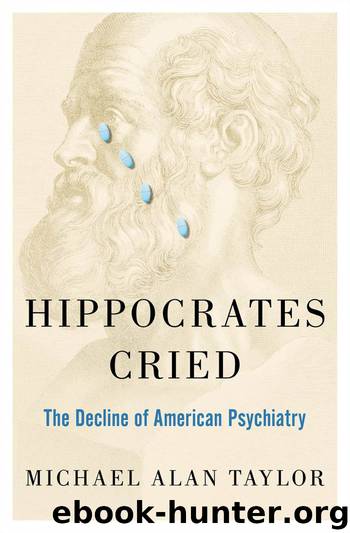Hippocrates Cried by Taylor Michael A.;

Author:Taylor, Michael A.;
Language: eng
Format: epub
Publisher: Oxford University Press, USA
Published: 2013-03-14T16:00:00+00:00
THE RAPACIOUS HEALTH INSURANCE INDUSTRY AND THEIR MINIONS
Those Who Don’t Care
Most everyone in the United States recognizes that the medical care system in the country if not broken, is bent. Those who don’t care about this situation fall into several groups. The first group is libertarians who are often at or near the poverty line, who have no health insurance and don’t want it because they can go to emergency rooms for assistance. By law they cannot be turned away. They think they are being independent and free of government, but the rest of society pays their bills through the U.S. treasury or with state funds. Such visits are many fold more expensive than is an office visit to a physician or clinic. Some inexpensive coverage and education about health care would save the country a bundle. As an example of the effect the libertarian position can have on health care, the republican-dominated Michigan legislature recently repealed the state’s motorcycle helmet requirement as the mostly libertarian biker community considered it a government intrusion. Many states have repealed similar laws for similar reasons, despite the data that show that the helmets save lives and reduce catastrophic health care costs. The costs are mostly born by the rest of us. According to the Center for Disease Control, between 2008 and 2010 only 12% of the over 14,000 motorcycle-related deaths during that period were from the 20 states that had helmet laws, saving over 3 billion dollars in health care costs. In the health care world, libertarian notions cost a lot of money.
At the other end of the sociological spectrum of persons who care little about health insurance is the very rich who don’t need health insurance as in a pinch they can always buy the hospital. A third group consists of ideological Darwinians like many in the U.S. congress who have gotten “their own” with a very good government-financed health insurance plan and so figure that those that do not have such a great plan brought the deficiency upon themselves and so don’t deserve coverage.
Last, but certainly not least, is the health insurance industry and their supporters that know the industry is interested only in collecting the premiums while not delivering the benefits. An example of industry’s attitude toward patient care occurred a few years ago when one of my responsibilities was evaluating patients who were said to have “treatment-resistant depression.” The term implies that there was a lack of response despite two treatment trials of adequate length with different antidepressants in adequate doses. For the most part, however, these patients have treatment deprived depression because they are almost never prescribed the older medications or ECT. Some patients I met had been so poorly evaluated that they weren’t even suffering from depressive illness. Those that did have a depressive illness often had been ill for years, but had been inadequately treated.
The patient in this example was referred specifically to see if she was a candidate for ECT. I thought she would benefit from the treatment and sent my written recommendations back to the referring psychiatrist.
Download
This site does not store any files on its server. We only index and link to content provided by other sites. Please contact the content providers to delete copyright contents if any and email us, we'll remove relevant links or contents immediately.
When Breath Becomes Air by Paul Kalanithi(7290)
Why We Sleep: Unlocking the Power of Sleep and Dreams by Matthew Walker(5678)
Paper Towns by Green John(4189)
The Immortal Life of Henrietta Lacks by Rebecca Skloot(3840)
The Sports Rules Book by Human Kinetics(3611)
Dynamic Alignment Through Imagery by Eric Franklin(3510)
ACSM's Complete Guide to Fitness & Health by ACSM(3481)
Kaplan MCAT Organic Chemistry Review: Created for MCAT 2015 (Kaplan Test Prep) by Kaplan(3436)
Introduction to Kinesiology by Shirl J. Hoffman(3315)
Livewired by David Eagleman(3152)
The River of Consciousness by Oliver Sacks(3007)
Alchemy and Alchemists by C. J. S. Thompson(2923)
The Death of the Heart by Elizabeth Bowen(2920)
Descartes' Error by Antonio Damasio(2757)
Bad Pharma by Ben Goldacre(2742)
The Gene: An Intimate History by Siddhartha Mukherjee(2509)
Kaplan MCAT Behavioral Sciences Review: Created for MCAT 2015 (Kaplan Test Prep) by Kaplan(2500)
The Fate of Rome: Climate, Disease, and the End of an Empire (The Princeton History of the Ancient World) by Kyle Harper(2451)
The Emperor of All Maladies: A Biography of Cancer by Siddhartha Mukherjee(2445)
